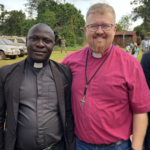
Retaining Hope In the Midst of Grief
09
September, 2021
Burnout
Soul Care
Grief
Loss
Peeking Out From Quarantine
Ok. Let’s admit something. We’re all pretty tired of this COVID thing. Are you feeling me? Can I get an Amen?
After two mandatory Sundays off, another week of homeschooling, and wondering if the sniffles are just allergies or a full-blown viral invasion of my respiratory system, the accompanying stress is, well, exhausting.
Yet, here we are again. Another week has come, and life continues to move forward.
So here’s the good news! My family and I are just fine. None of us experienced actual sickness — just a few days of exhaustion, a runny nose, and a lost voice. But even though COVID mildly impacted us, I can’t help but remember my friend Matt, who passed away from COVID at the same time we entered into quarantine.
Frankly, the quarantine time provided some needed time to mourn the loss of my friend.
This article is part two of a series on burnout.

Hope
Photo by Envato Elements
Processing Loss
So given the pandemic is still very real, how should Christians behave?
Well, I’ve been reflecting on grief a bit. And I’ve come to realize that we’re all experiencing some symptoms of grief.
There are different types of grief. According to one article I read, depending on the situation, we can experience it in various ways: grief from sudden loss, cumulative grief, absent grief, or anticipatory grief.
Let me give you an example from events this summer.
Just recently, our next-door neighbors moved away. We were sorry to see them leave. Their kids and our kids became fast friends, playing almost daily together.
Earlier this summer, after arriving home from our vacation, we learned that the father had accepted a new position, and they were relocating to another state.
My youngest, Chamblin, was impacted the most. He was about to lose his buddy.
As I watched him process this news, I could see him move through a predictable pattern: denial, anger, bargaining, depression, and acceptance. He was genuinely sad to see his friends, whom he spent much of the quarantine playing with, move on from his life.
We tried to reassure him that they could still talk to each other via their gaming systems, etc. But let’s face it, we all know that while today’s technology helps aid relationships at a distance, it is not a substitute for the real thing.
While he couldn’t articulate the complex emotion of grief, it was pretty clear to me that he was experiencing it. He vacillated from anger to depression to eventual acceptance. I felt bad for my kid because I knew it was a process he had to go through.
COVID reminds us that this world is a sick, dying rock floating in space. Our hope is not in its continuation but transformation only possible through faith.

As Christians, we hold to the promise that death is not the end. Hope is.
A Roller Coaster of Emotion
Turning our attention back to COVID, in many ways, we’ve all experienced a barrage of grief-induced emotions that move us back and forth on a spectrum from happy to sad, sad to happy. This roller coaster of emotions can be pretty exhausting if we’re not aware of their presence.
We need to remember that this pandemic has disrupted our lives in such ways that it will be a generationally defining moment in history.
The question will be, how will we respond?
As Christians, we need to remember the words of Jesus.
“My kingdom is not of this world” (John 18:36).
He said this to Pilate, the Roman governor who, by his command, could have liberated him from the pending doom anticipated by his enemies. More than any of us, Jesus knew what death entailed. Yet there he stood the God-man, the Creator of the Universe itself being interrogated by His very creation. What an odd scene.
Yet there Jesus stood, resolute in his position.
Jesus knew that death was the great enemy that had kept all of creation in bondage. And yet, at that moment, he could have exercised His divine authority and overthrown his accusers in a second. But he didn’t.
Why didn’t he? Because he knew his death would mean the death of death. Therein lies our hope.
As Christians, we hold to the promise that death is not the end. Hope is.
As believers, we have this hope. Christ will return. A new heaven and new earth lay ahead in the future. Quite literally, this world and all that is in it will be replaced by something far more glorious than we can imagine.
COVID reminds us that this world is a sick, dying rock floating in space. Our hope is not in its continuation but transformation only possible through faith.
Hope, then, is an aspect of faith in the midst of perpetual suffering and loss.
The Apostle Paul shared this same view:
“I am convinced that any suffering we endure is less than nothing compared to the magnitude of glory that is about to be unveiled within us” (Rom. 8:18 TPT).
So ask yourself today, in light of the crazy, paranoia-filled times are you expressing and representing hope?




